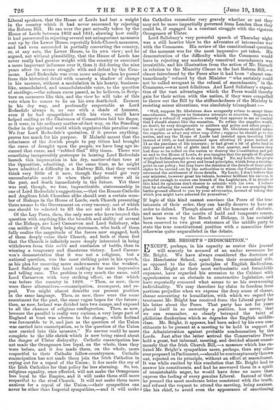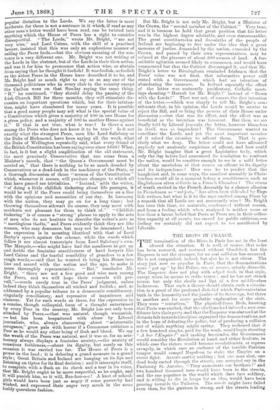MR. BRIGHT'S "INDISCRETION." E XCEPT, perhaps, in his capacity as orator
this journal will scarcely be accused of an undue reverence for Mr. Bright. We have always considered the doctrines of the Manchester School, apart from their economical side, as opposed to the first principles of English Radicalism, and Mr. Bright as their most enthusiastic and formidable exponent, have regarded his accession to the Cabinet with apprehension as an obstacle to constructive legislation, and have repeatedly censured what seems to us his overweening individuality. We may therefore lay claim to freedom from partizan prejudice when we express the deep sense of shame, shame amounting to humiliation, with which we regard the treatment Mr. Bright has received from the Liberal party for his letter about the Peers. That party has not for years. placed itself in so unworthy a position, has never, that we can remember, so clearly betrayed the taint of philistine flunkeyism which so degrades the English middleclass. Mr. Bright, it appears, had been asked by his own constituents to be present at a meeting to be held in support of the Administration against probable condemnation by the Lords. Just after the letter arrived the Conservative Peersheld a great, but informal, meeting, and decided almost unanimously that the Irish Church Bill,—a measure which has enlisted Mr. Bright's sympathies more, perhaps, than any other ever proposed in Parliament,—should be contemptuously thrown oat, rejected on its principle, without an effort at amendment. It was while excited by this resolution that Mr. Bright had to answer his constituents, and had he answered them in a spirit of unmistakable anger, he would have done no more than express the feeling of every genuine Liberal. Instead of that, he penned the most moderate letter consistent with the truth, and refused the request to attend the meeting, being anxious, like his chief, to avoid even the appearance of sanctioning popular dictation to the Lords. We say the letter is most moderate, for there is not a sentence in it which, if read as any other man's letter would have been read, can be twisted into anything which the House of Peers has a right to consider disrespectful. "The Lords," wrote Mr. Bright, "are not very wise," and Lord Cairns, with the skill of a practised lawyer, insisted that this was only an euphonious manner of calling the Peers fools,—but the obvious meaning of the sentence is a very different one. Mr. Bright was not writing of the Lords in the abstract, but of the Lords in their then action,
and was it for him to pronounce that action wise, or abstain from saying that he thought it foolish? It was foolish, as foolish as the ablest Peers in the House have described it to be, and Mr. Bright had as much right to say so as any one of the thousand politicians who in every club in the country except the Carlton were on that Sunday saying the same thing. "If," he continued, "they should delay the passing of the Irish Church Bill for three months, they will stimulate dis cussion on important questions which, but for their infatuation, might have slumbered for many years. It is possible that a good many people may ask what is the special value of a Constitution which gives a majority of 100 in one House for a given policy, and a majority of 100 in another House against it." If that is not true, what is true ? Is there a man among the Peers who does not know it to be true ? Is it not exactly what the strongest Peers, men like Lord Salisbury or the Duke of Richmond, have been saying all the week, what the Duke of Wellington repeatedly said, what every friend of the British Constitution has been saying ever since 1688? What, in fact, is it but a slight amplification of the old statement, the most genuinely Conservative that can come from a Minister's mouth, that "the Queen's Government must be carried on," that there is nothing to be so much dreaded by Conservatives as a dead-lock in the machinery of the State, or a thorough discussion of those "arcane of the Constitution" which, whenever it occurs, will produce changes to which all that have passed are trivialities. "Instead," adds the writer, "of doing a little childish tinkering about life peerages, it wonld be well if the Peers could bring themselves on a line with the opinions and necessities of our day. In harmony with the nation, they may go on for a long time ; but throwing themselves athwart its course, they may meet with accidents not pleasant for them to think of." "Childish tinkering" is of course a "strong" phrase to apply to the acts of men who do not hesitate to describe the writer's acts as "sacrilegious thefts," and Peers evidently think they are like women, who may denounce, but may not be denounced ; but the expression is in meaning identical with that of Lord Derby's speech against the scheme, while the words which follow it are almost transcripts from Lord Salisbury's own. The Marquis,—who might have had the manliness to get up and deride the feminine sensitiveness of hard lawyers like Lord Cairns and the tearful sensibility of grandees to a few rough words,—said that he wanted to bring his House into line and accord with the nation and the age, to make it more thoroughly representative. " But," concludes Mr. Bright, "there are not a few good and wise men among the Peers, and we will hope their counsels will preTail,"—words surely true in the Peers' judgment, unless indeed they think themselves all wicked and foolish ; and, as addressed by a popular tribune to a democratic constituency, singularly conciliatory, and repressive of impatience and clamour. Yet for such words as these, for the expression in a concise, though colloquial, form of a thought entertained by every Peer in the country, Mr. Bright has not only been attacked by Peers,—that was natural, though womanish, but has been bespattered with abuse by Liberal Journalists, who, always clamouring about "aristocratic
arrogance," grow pale with horror if a Commoner criticizes a
Peer as he would any other being of flesh and blood. We say the wrath of the Peers was natural, and it was so, for an aris tocracy always displays a feminine anxiety,—the anxiety of conscious feebleness,—about its dignity, but surely on this occasion it was carried too far. The House of Peers is a Power in the laud; it is debating a grand measure in a grand ntYle ; Great Britain and Ireland are hanging on its lips and listening on tiptoe for its final decision ; and it interrupts itself, to complain with a flush on its cheek and a tear in its voice, that Mr. Bright ought to be more respectful, so he ought, and it will punish him, so it will, Boo-hoo-o-o ! A knot of school girls would have been just as angry if some passer-by had Winked, and expressed their anger very much in the same feebly querulous fashion. But Mr. Bright is not only Mr. Bright, but a Minister of the Crown, the "second member of the Cabinet." Very true, and it is because he held that great position that his letter was in the highest degree advisable, and even statesmanlike. The great constituencies and five-sixths of the people of Ireland are beginning to fret under the idea that a great measure of justice, demanded by the nation, conceded by the Crown, and passed by their own representatives, may be refused at the pleasure of about 200 owners of land. A formidable agitation seemed likely to commence, and would have commenced but that the Cabinet discouraged it., and that Mr. Bright 's letter to Birmingham reminded Irishmen that the Peers' voice was not final, that substantive power still rested with a Government which had no intention of abandoning the measure. In Ireland especially the effect of the letter was eminently pacificatory, Catholic meetings shouting "Hurrah for Mr. Bright !" instead of "Down with the Lords !" That was not, of course, the first intention of the letter,—which was simply to tell Mr. Bright's constituents that, in his opinion, the Lords would be unwise to reject the Bill, and so bring the powers of their House under discussion ;—but that was its effect, and the effect was as beneficial as the intention was innocent. But then, we are finally told by Liberal journals, the letter, however blameless in itself, was so imprudent! The Government wanted to conciliate the Lords, and yet the most important member of it seized the occasion to affront them. That is precisely what we deny. The letter could not have affronted anybody not anxiously suspicious of affront, and how could Mr. Bright imagine that a great Legislative body, which only the day before had announced its resolution to confront the nation, would be sensitive enough to see in a mild letter about the unwisdom of that course an affront to its dignity and its independence ? How was he to predict that the haughtiest and, in some ways, the manliest assembly in Christendom would all in a moment betray a sensitiveness such as Englishmen often ridicule in a French Chamber ? The storm of wrath excited in the French Assembly by a chance allusion to Frenchmen as "subject., " has often been ridiculed by English writers, but what is it to the rage excited among Peers by a remark that all Lords are not necessarily wise ? Mr. Bright has been this time, we maintain, condemned without reason, and from a feeling which when analyzed is neither more or less than a latent belief that Peers as Peers are, in their collective capacity at all events, too sacred for public criticism,—a feeling we certainly did not expect to see manifested by Liberals.































 Previous page
Previous page